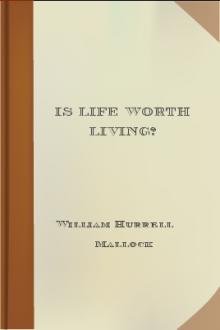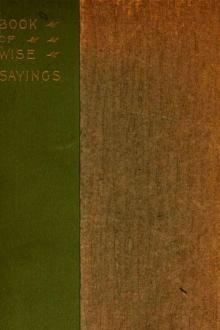Is Life Worth Living?, William Hurrell Mallock [if you give a mouse a cookie read aloud txt] 📗

- Author: William Hurrell Mallock
- Performer: -
Book online «Is Life Worth Living?, William Hurrell Mallock [if you give a mouse a cookie read aloud txt] 📗». Author William Hurrell Mallock
That example is Protestant Christianity, and the condition to which, after three centuries, it is now visibly bringing itself. It is at last beginning to exhibit to us the true result of the denial of infallibility to a religion that professes to be supernatural. We are at last beginning to see in it neither the purifier of a corrupted revelation, nor the corrupter of a pure revelation, but the practical denier of all revelation whatsoever. It is fast evaporating into a mere natural theism, and is thus showing us what, as a governing power, natural theism is. Let us look at England, Europe, and America, and consider the condition of the entire Protestant world. Religion, it is true, we shall still find in it; but it is religion from which not only the supernatural element is disappearing, but in which the natural element is fast becoming nebulous. It is indeed growing, as Mr. Leslie Stephen says it is, into a religion of dreams. All its doctrines are growing vague as dreams, and like dreams their outlines are for ever changing. Mr. Stephen has pitched on a very happy illustration of this. A distinguished clergyman of the English Church, he reminds us, has preached and published a set of sermons,38 in which he denies emphatically any belief in eternal punishment, although admitting at the same time that the opinion of the Christian world is against him. These sermons gave rise to a discussion in one of the leading monthly reviews, to which Protestant divines of all shades of opinion contributed their various arguments. 'It is barely possible,' says Mr. Stephen, 'with the best intentions, to take such a discussion seriously. Boswell tells us how a lady interrogated Dr. Johnson as to the nature of the spiritual body. She seemed desirous, he adds, of "knowing more; but he left the subject in obscurity." We smile at Boswell's evident impression that Johnson could, if he had chosen, have dispelled the darkness. When we find a number of educated gentlemen seriously enquiring as to the conditions of existence in the next world, we feel that they are sharing Boswell's naïveté without his excuse. What can any human being outside a pulpit say upon such a subject which does not amount to a confession of his own ignorance, coupled, it may be, with more or less suggestion of shadowy hopes and fears? Have the secrets of the prison-house really been revealed to Canon Farrar or Mr. Beresford Hope?... When men search into the unknowable, they naturally arrive at very different results.' And Mr. Stephen argues with perfect justice that if we are to judge Christianity from such discussions as these, its doctrines of a future life are all visibly receding into a vague 'dreamland;' and we shall be quite ready to admit, as he says, in words I have already quoted, 'that the impertinent young curate who tells [him he] will be burnt everlastingly for not sharing such superstitions, is just as ignorant as [Mr. Stephen himself], and that [Mr. Stephen] knows as much as [his] dog.'
The critic, in the foregoing passages, draws his conclusion from the condition of but one Protestant doctrine. But he might draw the same conclusion from all; for the condition of all of them is the same. The divinity of Christ, the nature of his atonement, the constitution of the Trinity, the efficacy of the sacraments, the inspiration of the Bible—there is not one of these points on which the doctrines, once so fiercely fought for, are not now, among the Protestants, getting as vague and varying, as weak and as compliant to the caprice of each individual thinker, as the doctrine of eternal punishment. And Mr. Stephen and his school exaggerate nothing in the way in which they represent the spectacle. Protestantism, in fact, is at last becoming explicitly what it always was implicitly, not a supernatural religion which fulfils the natural, but a natural religion which denies the supernatural.
And what, as a natural religion, is its working power in the world? Much of its earlier influence doubtless still survives; but that is a survival only of what is passing, and we must not judge it by that. We must judge it by what it is growing into, not by what it is growing out of. And judged in this way, its practical power—its moral, its teaching, its guiding power—is fast growing as weak and as uncertain as its theology. As long as its traditional moral system is in accordance with what men, on other grounds, approve of, it may serve to express the general tendency impressively, and to invest it with the sanction of many reverend associations. But let the general tendency once begin to conflict with it, and its inherent weakness in an instant becomes apparent. We may see this by considering the moral character of Christ, and the sort of weight that is claimed for His example. This example, so the Christian world teaches, is faultless and infallible; and as long as we believe this, the example has supreme authority. But apply to this the true Protestant method, and the authority soon shows signs of wavering. Let us once deny that Christ was more than a faultless man, and we lose by that denial our authority for asserting that he was as much as a faultless man. Even should it so happen that we do approve entirely of his conduct, it is we who are approving of him, not he who is approving of us. The old position is reversed: we become the patrons of our most worthy Judge eternal; and the moral infallibility is transferred from him to ourselves. In other words, the practical Protestant formula can be nothing more than this. The Protestant teacher says to us, 'Such a way of life is the best, take my word for it: and if you want an example, go to that excellent Son of David, who, take my word for it, was the very best of men.' But even in this case the question arises, how shall the Protestants interpret the character that they praise? And to this they can never give any satisfactory answer. What really happens with them is inevitable and obvious. The character is simply for them a symbol of what each happens to think most admirable; and the identity in all cases of its historical details does not produce an identity as of a single portrait, but an identity as of one frame applied to many. Mr. Matthew Arnold, for instance, sees in Jesus one sort of man, Father Newman another, Charles Kingsley another, and M. Renan another; and the Imitatio Christi, as understood by these, will be found in each case to mean a very different thing. The difference between these men, however, will seem almost unanimity, if we compare them with others who, so far as logic and authority go, have just as good a claim on our attention. There is hardly any conceivable aberration of moral licence that has not, in some quarter or other, embodied itself into a rule of life, and claimed to be the proper outcome of Protestant Christianity. Nor is this true only of the wilder and more eccentric sects. It is true of graver and more weighty thinkers also; so much so, that a theological school in Germany has maintained boldly 'that fornication is blameless, and that it is not interdicted by the precepts of the Gospel.'39
The matter, however, does not end thus. The men I have just mentioned agree, all of them, that Christ's moral example was perfect; and their only disagreement has been as to what that example was. But the Protestant logic will by no means leave us here. That alleged perfection, if we ourselves are to be the judges of it, is sure, by-and-by, to exhibit to us traces of imperfection. And this is exactly the thing that has already begun to happen. A generation ago one of the highest-minded and most logical of our English Protestants, Professor Francis Newman, declared that in Christ's character there were certain moral deficiencies;40 and the last blow to the moral authority of Protestantism was struck by one of its own household. It is true that Professor Newman's censures were small and were not irreverent. But if these could come from a man of his intense piety, what will and what do come from other quarters may be readily conjectured. Indeed, the fact is daily growing more and more evident, that for the world that still calls itself Protestant, the autocracy of Christ's moral example is gone; and its nominal retention of power only makes its real loss of it the more visible. It merely reflects and focalises the uncertainty that men are again feeling—the uncertainty and the sad bewilderment. The words and the countenance, once so sure and steadfast, now change, as we look at, and listen to them, into new accents and aspects; and the more earnestly we gaze and listen, the less can we distinguish clearly what we hear or see. 'What shall we do to be saved?' men are again crying. And the lips that were once oracular now merely seem to murmur back confusedly, 'Alas! what shall you do?'
Such and so helpless, even now, is natural theism showing itself; and in the dim and momentous changes that are coming over things, in the vast flux of opinion that is preparing, in the earthquake that is rocking the moral ground under us, overturning and engulfing the former landmarks, and re-opening the graves of the buried lusts of paganism, it will show itself very soon more helpless still. Its feet are on the earth, only. The earth trembles, and it trembles: it is in the same case as we are. It stretches in vain its imploring hands to heaven. But the heaven takes no heed of it. No divine hand reaches down to it to uphold and guide it.
This must be the feeling, I believe, of most honest and practical men, with regard to natural religion, and its necessary practical inefficiency. Nor will the want it necessarily leaves of a moral rule be the only consideration that will force this conviction on them. The heart, as the phrase goes, will corroborate the evidence of the head. It will be felt, even more forcibly than it can be reasoned, that if there be indeed a God who loves and cares for men, he must surely, or almost surely, have spoken in some audible and certain way to them. At any rate I shall not be without many who agree with me, when I say that for the would-be religious world it is an anxious and earnest question whether any special and explicit revelation from God exist for us; and this being the case, it will be not lost time if we try to deal fairly and dispassionately with the question.
Before going further, however, let us call to mind two things. Let us remember first, that if we expect to find a revelation at all, it is morally certain that it must be a revelation already in existence. It is hardly possible, if we consider that all the supernatural claims that have been made hitherto are false, to expect that a new manifestation, altogether different in kind, is in store for the world in the future. Secondly, our enquiries being thus confined to religions that are already in existence, what we are practically concerned with is the truth of Christianity only. It is true that we have heard, on all sides, of the superiority





Comments (0)